Margaret Wilson: Flying Nightingale, 95, seeks fellow nurse's family
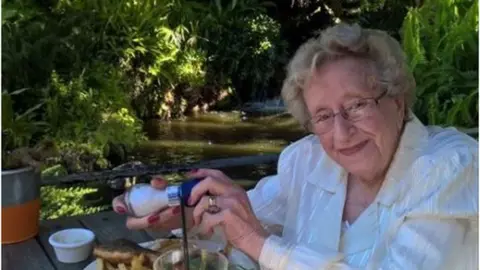 Margaret Wilson
Margaret WilsonOne of the last living air ambulance nurses to have served during World War Two is seeking help with tracking down a former colleague's family.
Margaret Wilson, 95, was one of 95 nurses who risked their lives transporting nearly 100,000 wounded soldiers to British hospitals.
Known as the Flying Nightingales, the nurses went unrecognised until 2008.
Mrs Wilson says she hopes to contact the family of Margaret Walsh, one of two nurses who died in action.
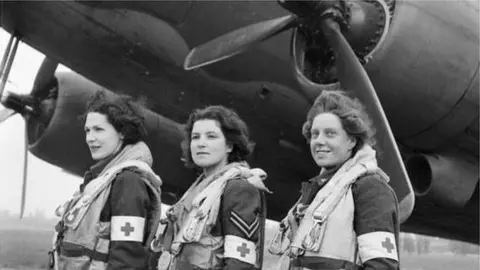 Air Ambulance Nurses
Air Ambulance NursesThe nurses were sent into mainland Europe from three bases in England from 1944. Because their outbound planes were carrying ammunition supplies for the forces, they were unable to use the Red Cross emblem to protect them from attack.
Although the nurses were given parachutes, they were told they were not allowed to use them if the plane was shot down on its return from Europe.
Instead, they had to stay with the wounded soldiers and be on hand to provide medical support should anyone survive the crash.
In 2015, the BBC tracked down Lilian West who believed she was the last living Flying Nightingale.
But, following the article, London-born Mrs Wilson, who now lives in Perth, Australia, came forward.
She said had never been on an aircraft before she applied to join the Women's Auxiliary Air Force (WAAF).
"The reaction I would have now would be, 'Hey, no way. I'm not going up there'," she said. "But it's amazing the sort of things you do during a war."
Mrs Wilson was stationed at Down Ampney, in Gloucestershire, and shared a hut with another nurse - Margaret Walsh, whose plane went down over the Channel in April 1945.
Miss Walsh, 33, from Hove, Sussex, was lost along with the crew.
It is believed she was the daughter of Major Patrick Walsh and Mary Margaret Walsh
"Margaret used to read cards and we used to take the mickey a little bit," said Mrs Wilson.
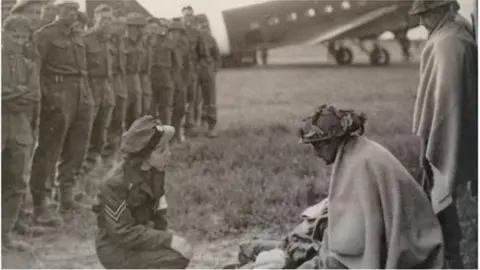 Air Ambulance Nurses
Air Ambulance Nurses"One day I came back from my flight into the hut and I saw she was upset. She was due to go out and she had obviously seen something on the cards.
"I said, 'If you are worried, I'll take your place on the plane. No problem. I'm all dressed to go.' But Margaret wouldn't let me.
"I think the middle of the next day, we were told that the plane was lost over the Channel. Margaret's body was never found.
"The incident still lives with me so clearly and it's one of my big sorrows I was never able to contact her family and talk to them about her. I can still see her face - I can still remember her."
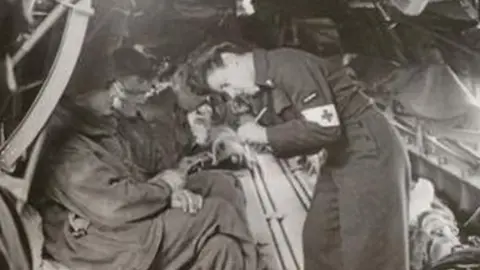 Air Ambulance Nurses
Air Ambulance NursesMrs Wilson made dozens of trips across the Channel between 1944 and 1945, transporting wounded soldiers and freed prisoners of war in RAF Dakota planes to British hospitals.
"Each plane had only one nurse to look after between 10 and 20 very badly wounded soldiers," she said.
"Some had lost legs and arms, some were blind and had injuries. It was so sad. They were mostly young boys, about the same age as me, 20 or 21 years old."
One of her last flights was on 8 May. "We were halfway home when the pilot called out, "Hey boys! The war is over!" Well, I have never been kissed by so many men in my life," she said.
"We were all crying and laughing at the good news. That was the happiest flight of all."
She left the air force in 1945 and got married. However, she never mentioned her nursing career to her friends or family.
"My own sons didn't know until about 20 years ago," she said.
"My Australian friends were fuming when they found out about the award - I had never told them about what I did.
"I suppose it's a generational thing. Personally, I don't think there was anything brave about it. We were just doing a job. We didn't expect any recognition."
The nurses' bravery was largely forgotten until 2008 when they were finally honoured for their bravery.
Mrs Wilson, who emigrated in 1968, was presented with a statue of Florence Nightingale and a letter signed by the Duchess of Cornwall at a ceremony in Australia.
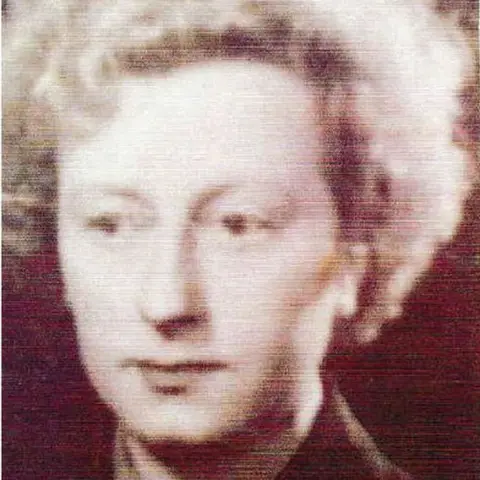 Margaret Wilson
Margaret WilsonShe was also invited to a grand tea at a museum run by the Royal Australian Air Force where she was allowed to go inside an old Dakota.
"It brought back so many memories," she said.
"I am ashamed to say I shed a few tears."
